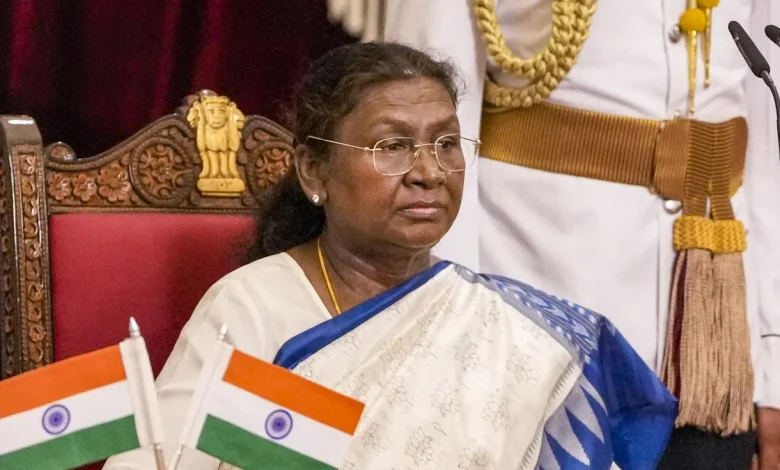Presidential Reference: Supreme Court’s responses to President Murmu’s 14 questions

A five-judge Bench of the Supreme Court, with none of the judges claiming sole authorship but fashioning it as the ‘Opinion of the Court’, opined that the apex court cannot fix timelines for Governors and the President to deal with State Bills under Articles 200 and 201.
However, the Bench clarified that Governors could also not use their discretion to resort to “prolonged and evasive constitutional inaction” in a deliberate bid to thwart the people’s will expressed through proposed laws passed by State legislatures.
Presidential Reference hearing updates – November 20, 2025
Here is how a Bench headed by Chief Justice B.R. Gavai, also comprising Justices Surya Kant, Vikram Nath, P.S. Narasimha and A.S. Chandurkar, responded, in its 111-page opinion, to the 14 questions from President Droupadi Murmu in a Reference issued by her on May 13, 2025.
The Reference under Article 143 of the Constitution came merely a month after a two-judge Bench of the Supreme Court, in a judgment in the Tamil Nadu Governor case on April 8, plugged a Constitutional silence by fixing specific time limits for Governors and the President to assent, withhold approval or reserve State Bills for further consideration under Articles 200 and 201.
1. What are the constitutional options before a Governor when a Bill is presented to him under Article 200 of the Constitution of India?
The Governor has three constitutional options under Article 200, namely to assent, reserve the Bill for the President’s consideration, or withhold assent and return the Bill to the Legislature with comments. The first proviso to Article 200 is bound to the substantive part of the provision, and restricts the existing options, rather than offering a fourth option. Pertinently, the third option — to withhold assent and return with comments — is only available to the Governor when it is not a Money Bill.
2. Is the Governor bound by the aid and advice tendered by the Council of Ministers while exercising all the options available with him when a Bill is presented before him under Article 200 of the Constitution of India?
The Governor enjoys discretion in choosing from these three constitutional options and is not bound by the aid and advice of the Council of Ministers, while exercising his function under Article 200.
3. Is the exercise of constitutional discretion by the Governor under Article 200 of the Constitution of India justiciable?
The discharge of the Governor’s function under Article 200 is not justiciable. The Court cannot enter into a merits review of the decision so taken. However, in glaring circumstances of inaction that is prolonged, unexplained, and indefinite, the Court can issue a limited mandamus for the Governor to discharge his function under Article 200 within a reasonable time period, without making any observations on the merits of the exercise of his discretion.
4. Is Article 361 of the Constitution of India an absolute bar to judicial review in relation to the actions of a Governor under Article 200 of the Constitution of India?
Article 361 of the Constitution is an absolute bar on judicial review in relation to personally subjecting the Governor to judicial proceedings. However, it cannot be relied upon to negate the limited scope of judicial review that this Court is empowered to exercise in situations of prolonged inaction by the Governor under Article 200. It is clarified that while the Governor continues to enjoy personal immunity, the constitutional office of the Governor is subject to the jurisdiction of this court.
5. In the absence of a constitutionally prescribed time limit and the manner of exercise of powers by the Governor, can timelines be imposed and the manner of exercise be prescribed through judicial orders for the exercise of all powers under Article 200 of the Constitution of India by the Governor?
In the absence of constitutionally prescribed time limits, and the manner of exercise of power by the Governor, it would not be appropriate for this Court to judicially prescribe timelines for the exercise of powers under Article 200.
6. Is the exercise of constitutional discretion by the President under Article 201 of the Constitution of India justiciable?
For similar reasoning as held with respect to the Governor, the President’s assent under Article 201 too, is not justiciable.
7. In the absence of a constitutionally prescribed timeline and the manner of exercise of powers by the President, can timelines be imposed and the manner of exercise be prescribed through judicial orders for the exercise of discretion by the President Under Article 201 of the Constitution of India?
For the same reasons as indicated in the context of the Governor under Article 200, it is clarified that the President, too, cannot be bound by judicially prescribed timelines in the discharge of functions under Article 201.
8. In light of the constitutional scheme governing the powers of the President, is the President required to seek advice of the Supreme Court by way of a reference under Article 143 of the Constitution of India and take the opinion of the Supreme Court when the Governor reserves a Bill for the President’s assent or otherwise?
In our constitutional scheme, the President is not required to seek advice of this Court by way of reference under Article 143, every time a Governor reserves a Bill for the President’s assent. The subjective satisfaction of the President is sufficient. If there is a lack of clarity, or the President so requires advice of this Court on a Bill, it may be referred under Article 143, as it has been done on numerous previous occasions.
9. Are the decisions of the Governor and the President under Article 200 and Article 201 of the Constitution of India, respectively, justiciable at a stage anterior into the law coming into force? Is it permissible for the Courts to undertake judicial adjudication over the contents of a Bill, in any manner, before it becomes law?
The decisions of the Governor and President under Articles 200 and 201, respectively, are not justiciable at a stage anterior into the law coming into force. It is impermissible for the Courts to undertake judicial adjudication over the contents of a Bill, in any manner, before it becomes law. Pertinently, discharge of its role under Article 143, does not constitute ‘judicial adjudication’.
10. Can the exercise of constitutional powers and the orders of/by the President/Governor be substituted in any manner under Article 142 of the Constitution of India?
The exercise of constitutional powers and the orders of the President/Governor cannot be substituted in any manner under Article 142, and we hereby clarify that the Constitution, specifically Article 142 even does not allow for the concept of ‘deemed assent’ of Bills.
11. Is a law made by the State legislature a law in force without the assent of the Governor granted under Article 200 of the Constitution of India?
Question 11 is answered in accordance with our opinion tendered on Question 10, i.e., there is no question of a law made by the State Legislature coming into force without assent of the Governor under Article 200. The Governor’s legislative role under Article 200 cannot be supplanted by another constitutional authority.
12. In view of the proviso to Article 145(3) of the Constitution of India, is it not mandatory for any bench of this Hon’ble Court to first decide as to whether the question involved in the proceedings before it is of such a nature which involves substantial questions of law as to the interpretation of constitution and to refer it to a bench of minimum five Judges?
We have already indicated in our opinion that Question 12 relating to Article 145(3) and the composition of benches in this Court that hear cases of constitutional importance is irrelevant to the functional nature of this reference, and is returned unanswered.
13. Do the powers of the Supreme Court under Article 142 of the Constitution of India limited to matters of procedural law or Article 142 of the Constitution of India extend to issuing directions/passing orders which are contrary to or inconsistent with existing substantive or procedural provisions of the Constitution or law in Force?
We have also indicated in our opinion that Question 13 concerning the power under Article 142 is overly broad, and not possible to answer in a definitive manner. Our opinion on the scope of Article 142 in the context of the functions of the Governor and President has already been answered as a part of Question 10.
14. Does the Constitution bar any other jurisdiction of the Supreme Court to resolve disputes between the Union Government and the State Governments except by way of a suit under Article 131 of the Constitution of India?
Question 14 — pertaining to this Court’s jurisdiction to resolve disputes between the Union and State Governments outside of Article 131 — is also found to be irrelevant to the functional nature of the reference and hence returned unanswered.
Published – November 20, 2025 12:24 pm IST




